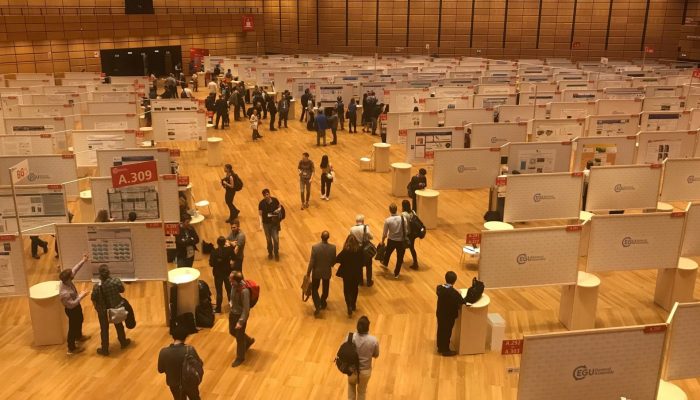
EGU is a bit like a music festival. Maybe not as crowded as the Donauinselfest, but you’ll definitively experience some of this type of event classic features: dilly-dallying a lot about what to see next, losing your friends and setting up more or less detailed meeting points, buying overpriced food and beverages. And if in the right place at the right time, you might even see some actual “rock stars”!

Me and my Mentor!
EGU is a lot of people and a lot of contents squeezed into one week! Now it can be quite unsettling for newcomers, but here’s some points to demystify the beast.
Despite the ants-like flow in the hallways, EGU recovers human dimensions during each oral session, with an average attendance of about 40 people for what I could experience. It’s something to have in mind when getting nervous about your own scheduled presentation if there’s any.
Half of people is like you, meaning young scientists, eager to share and help each other. And fortunately, the other half is just the same, with more experience and possibly less hair that’s all. Communicating is very easy at EGU, with all kind of researchers (age-wise, country-wise, topic-wise). That’s probably the main purpose of it and the main reason you should come.
There’s also a bunch of events and special groups intended for facilitating new scientists’ integration: Sunday evening Ice-breaker, Early Career Scientists lounge, short courses and workshops and social evening events, etc. In particular, when registering for the EGU General Assembly, you’ll be asked if you want to be part of a Mentoring program. Say yes and you’ll be put in touch with a more experienced participant that’ll give you further advice and with whom you can meet easily throughout the week. I experienced this mentoring to be a good way to get comfortable in the unfamiliar terrain of such a big conference!
Now, how to make the most of this week you may wonder. Well there is no right answer to that I suppose, but here’s some input.

Red poster hall – the heart of hydrology during the EGU week.
Quoting approximately the EGU’s president introduction speech, go beyond your own field of research. It would be a shame to spend a whole week focusing on what you’re working the rest of the year anyway, when so much is at hand. As for myself (doing a PhD on computational methods in hydrogeology), I attended sessions about surface water quality, erosion processes, ecology, geothermal resources, or science-politics linkage (this last inspired me some thought that I’ll may be able to share with you later). At some point lost in the program and venue, I even stumble about a speech about hyper arid environments, where I heard that some place in Chile receive less than 1 mm of precipitation a year… things you learn when you get lost!
And to conclude, you might feel obligated to spend 10 hours a day in the Vienna International Center, with regard to the plethoric program. Well I do think that it should be judged by your own ability to concentrate and digest information in a little amount of time. As far as I’m concerned, I chose not to fully book every day with session, sparing some time to rest, wander and visit! Mind that Vienna is a key European historical and cultural center: the apogee of classical and romantic music genres, one of the birthplaces of modernism in painting and architecture, a land of authors and philosophers to be discovered.
Edited by Matthias Sprenger
________________________________________
 Guest author Dimitri Rambourg attended this year’s EGU General Assembly the first time and he shares his impression. He is a PhD student at Laboratoire d’Hydrologie et de Géochimie de Strasbourg (LHYGES) in France.
Guest author Dimitri Rambourg attended this year’s EGU General Assembly the first time and he shares his impression. He is a PhD student at Laboratoire d’Hydrologie et de Géochimie de Strasbourg (LHYGES) in France.
